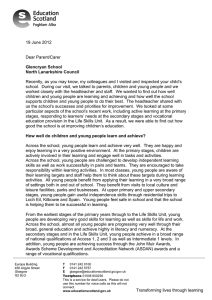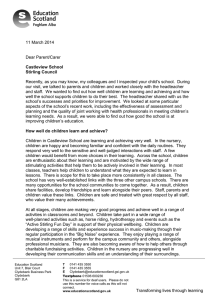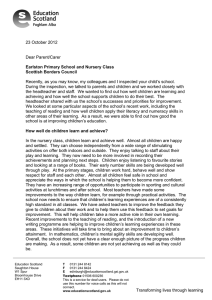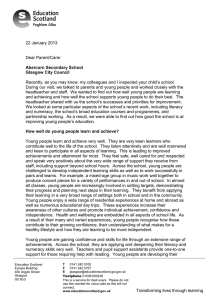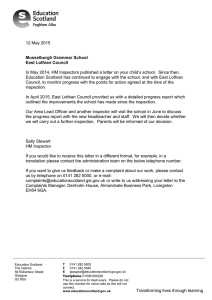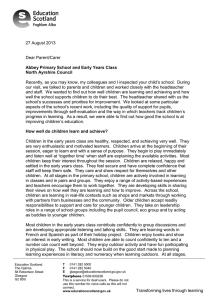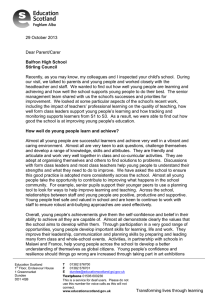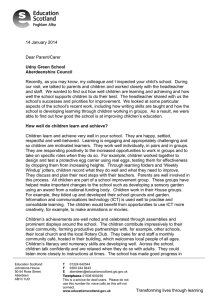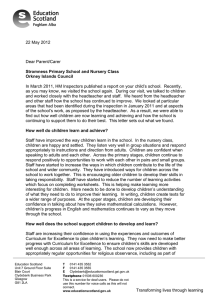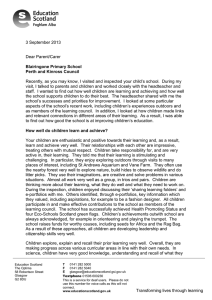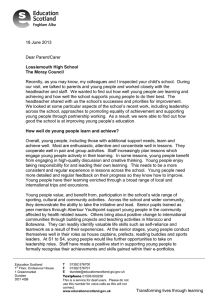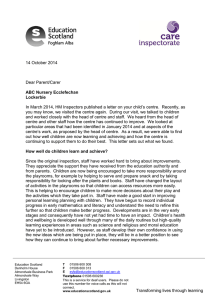19 March 2013 Dear Parent/Carer
advertisement
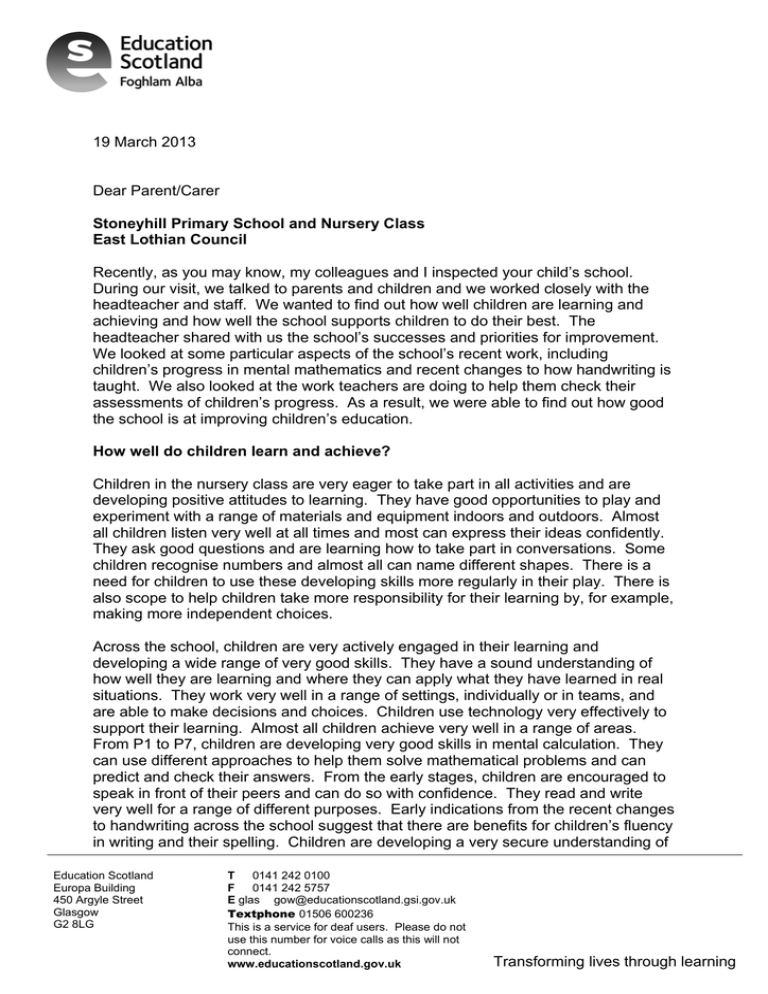
19 March 2013 Dear Parent/Carer Stoneyhill Primary School and Nursery Class East Lothian Council Recently, as you may know, my colleagues and I inspected your child’s school. During our visit, we talked to parents and children and we worked closely with the headteacher and staff. We wanted to find out how well children are learning and achieving and how well the school supports children to do their best. The headteacher shared with us the school’s successes and priorities for improvement. We looked at some particular aspects of the school’s recent work, including children’s progress in mental mathematics and recent changes to how handwriting is taught. We also looked at the work teachers are doing to help them check their assessments of children’s progress. As a result, we were able to find out how good the school is at improving children’s education. How well do children learn and achieve? Children in the nursery class are very eager to take part in all activities and are developing positive attitudes to learning. They have good opportunities to play and experiment with a range of materials and equipment indoors and outdoors. Almost all children listen very well at all times and most can express their ideas confidently. They ask good questions and are learning how to take part in conversations. Some children recognise numbers and almost all can name different shapes. There is a need for children to use these developing skills more regularly in their play. There is also scope to help children take more responsibility for their learning by, for example, making more independent choices. Across the school, children are very actively engaged in their learning and developing a wide range of very good skills. They have a sound understanding of how well they are learning and where they can apply what they have learned in real situations. They work very well in a range of settings, individually or in teams, and are able to make decisions and choices. Children use technology very effectively to support their learning. Almost all children achieve very well in a range of areas. From P1 to P7, children are developing very good skills in mental calculation. They can use different approaches to help them solve mathematical problems and can predict and check their answers. From the early stages, children are encouraged to speak in front of their peers and can do so with confidence. They read and write very well for a range of different purposes. Early indications from the recent changes to handwriting across the school suggest that there are benefits for children’s fluency in writing and their spelling. Children are developing a very secure understanding of Education Scotland Europa Building 450 Argyle Street Glasgow G2 8LG T 0141 242 0100 F 0141 242 5757 E glas gow@educationscotland.gsi.gov.uk Textphone 01506 600236 This is a service for deaf users. Please do not use this number for voice calls as this will not connect. www.educationscotland.gov.uk Transforming lives through learning a range of health and wellbeing issues such as the need to maintain healthy and active lifestyles. They are making very strong progress across a range of other curricular areas. In science, for example, children’s understanding of a range of topics, such as energy, and the impact on their lives is being very well developed. Children are encouraged and supported to show initiative and take on responsibilities across the school. Examples include preparing and leading events for children and parents on behalf of the charities group, as Junior Road Safety Officers or as part of an enterprise challenge. Building on these strengths, there is room to extend children’s leadership skills even further, especially at the upper stages. How well does the school support children to develop and learn? Staff know children very well and are very responsive to their learning needs. They set tasks and activities that are appropriate, and regularly check children’s understanding. Staff make very good use of questioning to encourage children to extend their thinking. Children’s progress is well tracked across their time in school, allowing staff to identify where children can benefit from additional challenge or support. Staff are developing new ways of enabling you, as parents, to have a fuller understanding of what your children are learning. A commendable example of this is the highly effective child-led parents’ evenings. Children are very well supported to move from one stage of learning to another, such as from P7 to secondary. Teachers work exceptionally well together to develop their shared knowledge and understanding of the curriculum. As a result, they are very focused on what children are entitled to learn and plan a wide range of stimulating topics and activities to make this happen. This is most evident in the primary classes. Staff work with children from what they already know and help them to apply their skills in meaningful, real-life settings. Staff work with a range of partners, including you, as parents, to extend and enrich the curriculum. Commendable examples of this include the school’s work with Queen Margaret University and the Friday morning Building Our Stoneyhill Skills (BOSS) clubs. How well does the school improve the quality of its work? The commitment and ability of staff to continuously improve the quality of their work is a distinguishing feature of the school. The very positive impact of this on children’s experiences is evident. Staff make very good use of the wide range of information they collate about the school’s progress. They have recently introduced a web-based approach to managing this information and are using it very effectively. Working with children and yourselves, as parents, staff regularly evaluate what they do and make changes accordingly. A recent example has been the change to Friday morning activities. The headteacher is a very strong leader who promotes the reflection, collective responsibility and innovation that are evident in the staff team. She has managed the pace of curriculum change exceptionally well and, working with staff, uses her skills to support development in the Musselburgh cluster and across the authority. An example of this is the lead currently being given by Stoneyhill school staff in checking and confirming teachers’ assessments of children’s progress. Stoneyhill Primary School is very well placed to continue to deliver high quality education. 2 This inspection found the following key strengths. • • • • Children who are very well motivated and supported to succeed. Children’s progress across a range of curricular areas. A rich and varied curriculum enabling children to experience high quality learning. The leadership shown by the headteacher and the staff team in securing improvements for children. We discussed with staff and the education authority how they might continue to improve the school and nursery class. This is what we agreed with them. • Increase the pace of planned improvements in the nursery class. What happens at the end of the inspection? We are satisfied with the overall quality of provision. We are confident that the school’s self-evaluation processes are leading to improvements. As a result, we will make no further evaluative visits in connection with this inspection. During the inspection, we identified an aspect of innovative practice which we would like to explore further in order to share the practice with others. This is the work currently being led by the school within the Musselburgh cluster. As a result we will work with the school and local authority in order to record and share more widely the innovative practice. We will ask the school, in discussion with the local authority, to let parents know the outcome of the innovative practice visit(s). Joan Mackay HM Inspector Additional inspection evidence, such as details of the quality indicator evaluations, for your school can be found on the Education Scotland website at http://www.educationscotland.gov.uk/inspectionandreview/reports/school/primsec/St oneyhillPrimarySchoolEastLothian.asp. If you would like to receive this report in a different format, for example, in a translation please contact the administration team on the above telephone number. If you want to give us feedback or make a complaint about our work, please contact us by telephone on 0141 282 5000, or e-mail: complaints@educationscotland.gsi.gov.uk or write to us addressing your letter to the Complaints Manager, Denholm House, Almondvale Business Park, Livingston EH54 6GA. 3
